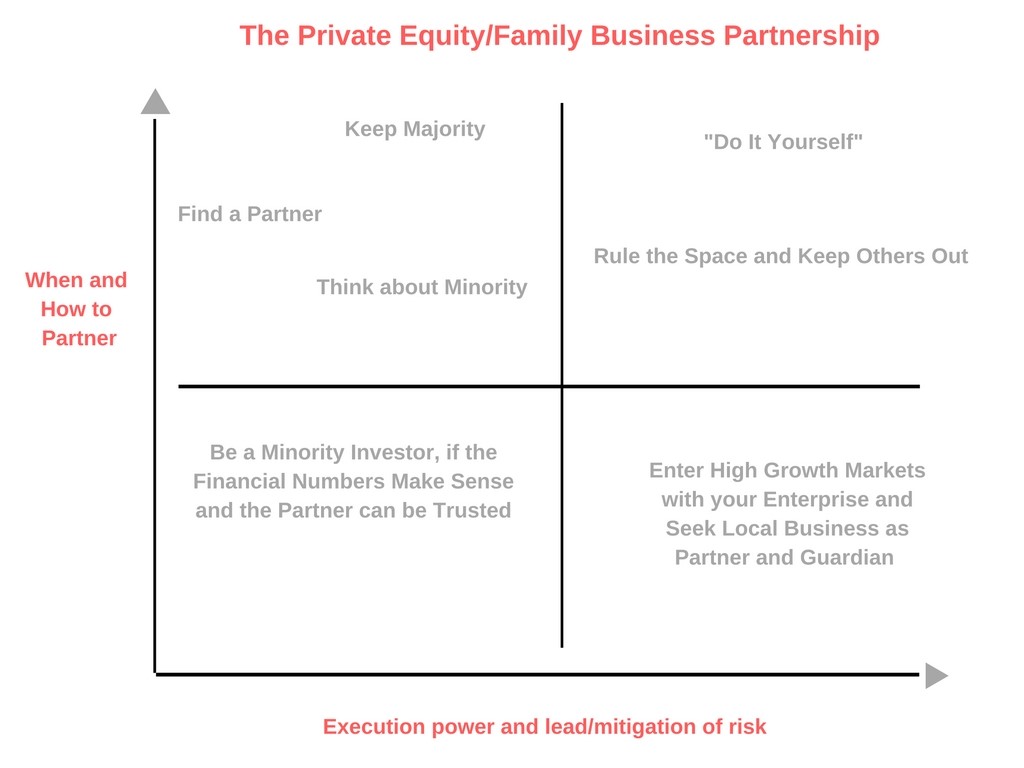
For a long time, private equity funds and family businesses have been like water and fire. The private equity funds were the bad guys, said the family businesses, and the family businesses were the targets, said the private equity investor. PE funds were bad because they tried to snap up family businesses on the cheap, leveraged them up, fire staff, and sell them on. They were seen as the Gordon Gekko “Greed is Good” of the business world. Family businesses were complex, slow, and ripe for efficiency increases; the low hanging fruit for the sharp investor. However, the judgment has matured and the PE business models advanced.

Although some of these feelings might still be around, it’s a narrow way of looking at the relationship. Why? Because there are various ways in which the two groups can be partners for growth and wealth creation across generations and into new markets. These ways might not seem obvious, but are an interesting addition to the discussion on how the two groups could collaborate.
A partnership can develop in two directions – the family business invites a private equity group as a partner, or a private equity group invites the family business as a partner. After all, private equity funds have specialist expertise and need to put money to work, and families have reputation, market access, and might want to take money off the table in certain areas of their portfolio, because families grow and need cash, or they might simply want to transfer some money to the private. Hence, cooperation can be mutually beneficial.
Here’s how they can be partners to enter new markets and fields of business together. The thoughts are explained in the accompanying chart.
If you’re a private equity player and have a lot of knowledge of a specific industry and region, but you want to explore opportunities in other markets, like, for example, emerging markets, you will have little or no knowledge about those places and the business dynamics behind. You effectively sit in the lower right-hand side of our chart.
A local business family can help the private equity firm to be more successful in these markets, for example, by helping to internationalize a portfolio company. Ideally, you want to connect capital and execution knowledge of a private equity fund with the local market insights, reputation, and network of a well-known family business in a foreign region. So, this is where a family could be a very worthwhile partner to a fund. Not a limited partner in the traditional sense, but a partner of growth.
A family that’s very strong in their local markets could profit from a partnership with someone who brings in additional capital, international connections, and further industry expertise, so they can rule their home market even more and potentially go international together. Effectively, through cooperating with a private equity group, a family business can aim to be in the top right-hand corner of our chart – the most advantageous place to be.
Inevitably, relationships between family businesses and private equity funds are likely to grow, especially in emerging markets. Private equity funds are going to be looking more towards emerging markets in the future because economic growth in many of the developed markets is stagnated and interest rates are near to zero. But how much do they know about these markets? They need to cooperate with the leading local players to gain that knowledge – the reputed, networked, and knowledgeable family businesses there.
On the other side, family businesses everywhere, and especially in emerging markets, are facing increasing global pressures and the impact of digital disruption. They have to step up their efforts to compete. Leveraging their strong position in their local market and ruling that market even more through capital and global market access from a private equity fund could be a path to further growth. This doesn’t mean that they have to sell the business – family businesses can give away a minority stake and keep control of a potentially even larger, more international, and more efficient business.
A partnership with a private equity fund can even be linked to succession planning – if succession to the next generation strives for less operational involvement, the family can sell additional parts of the business, and over time maybe even the majority. The relationship can be a step by step partnership, where certain goals and preconditions are agreed before greater cooperation happens.
Of course, all this sounds good and there is evidence that an alignment of interest between family businesses and private equity groups can happen along the lines discussed. But often the business models aren’t aligned, e.g., the time periods don’t match – the fund wants a five to seven year time period to realize their objectives, whereas the family wants 20 years or generations.
In this case, how can you build a structure that is aligned? People are trying to do this, but there aren’t any convincing examples of it working yet. That’s because everyone falls back into the logic of general and limited partners, not true long-term partners. So one party always wants to rule the show. In this respect, it becomes a classic case of the prisoner’s dilemma – cooperation makes sense, but it’s almost impossible to achieve.
Let’s see if innovative fund managers and forward-thinking business families find ways to solve this conundrum for a win-win scenario.





